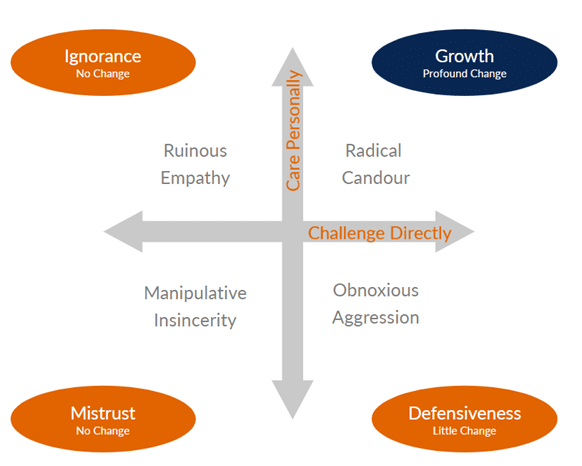In many of our Mastering Challenging Conversations and Driving Performance Through Feedback modules we design for clients here at Transform Performance, we draw inspiration from Kim Scott’s book on Radical Candour. It emphasises the importance of caring personally and challenging directly to create a workplace where feedback is sincere and growth is nurtured.
We also explore the nuances of different behavioural types, such as in the DiSC model, and we teach leaders how to effectively implement radical candour strategies tailored to their team members’ preferences, and their own preferences. It’s such an interesting perspective that can really revolutionise the dynamics in an organisation.
Embracing Radical Candour
First we should start with the basics of this leadership philosophy and how it relates to the DiSC profiles.
Radical Candour is a simple idea. There are two sides (see the x and y axis!)
- Y axis: The first dimension is caring personally
- X axis: The second dimension is challenging directly

One: The Power of Caring Personally
Caring personally is a cornerstone of radical candour. It’s about seeing team members as whole individuals, not just workers.
When leaders care personally, they forge deeper connections, which creates trust. This trust is essential for a team’s success, as it makes it easier to navigate difficult conversations and deliver feedback that may be tough to hear but is necessary for growth.
By showing genuine interest in the wellbeing and development of each person, leaders set a foundation for honest communication. This doesn’t mean being overly soft or avoiding hard truths; it means being empathetic and understanding, which can make all the difference in how feedback is received and acted upon.
Now take the DiSC behavioural types. Depending on someone’s behavioural style, caring personally will be interpreted differently and people may be more or less comfortable with their leader’s enquiries into their wellbeing. Depending on the leader’s style, they may also interpret caring personally differently:
- D (dominance) style – will struggle with the caring element as they tend to be more blunt than overly caring
- I (influence) style – will overplay this approach, and be drawn into ‘ruinous empathy’ by focusing on avoiding hurting people’s feelings
- S (steadiness) style – these types are the most comfortable in ‘ruinous empathy’ and would need training to achieve radical candour
- C (conscientiousness) style – would see caring personally as potentially insincere, preferring to focus on facts
Isn’t that interesting to think about? By understanding these nuances, leaders can tailor their approach to ensure their genuine care is perceived positively by their people.
Two: The Art of Challenging Directly
Challenging directly is the other half of the radical candour equation. It involves clearly and honestly communicating issues and concerns to team members, with the intent of helping them improve.
It’s not about being harsh or critical for the sake of it, but rather about being transparent and straightforward, which can lead to meaningful progress. This directness shows respect for team members’ abilities to handle and act on feedback, and it avoids the confusion that can arise from vague or sugar-coated messages.
However, mastering this art requires finesse; it’s important to balance forthrightness with tact.
As with the caring personally element, leaders should also approach this in different ways depending on their employee’s behavioural type. And what about the leader’s own behavioural type? Using the DiSC model, here’s what you could expect from different leaders:
- D (dominance) style – more likely to use ‘obnoxious aggression’ with lots of ‘challenge others’ but less ‘care personally’
- I (influence) style – will struggle with challenging directly due to their dislike of direct confrontation
- S (steadiness) style – will prioritise caring for others’ feelings so will prefer a harmonious approach and less challenge
- C (conscientiousness) style – focuses on facts over feelings so more inclined to ‘obnoxious aggression’ but will understand benefits of finding a balance
Recognising these differences ensures that feedback is delivered in a way that balances clarity with empathy, fostering growth while avoiding pitfalls like obnoxious aggression or excessive harmony.
When done correctly, challenging directly doesn’t damage relationships, it strengthens them. It demonstrates a commitment to everyone’s development. Embracing this practice can cultivate a culture where feedback is not feared but welcomed as a catalyst for personal and professional growth.
Come back in the New Year for our second blog in this Radical Candour series – we’ll share some practical steps leaders can take to create a culture of open dialogue, continuous development, and meaningful growth within their teams.
At Transform Performance, we design bespoke Radical Candour modules tailored to your leaders’ unique needs and challenges. Let’s work together to empower your leaders to create high-performing, growth-oriented teams.
You can reach us via the contact page or call +44 (0) 1488 658686.



